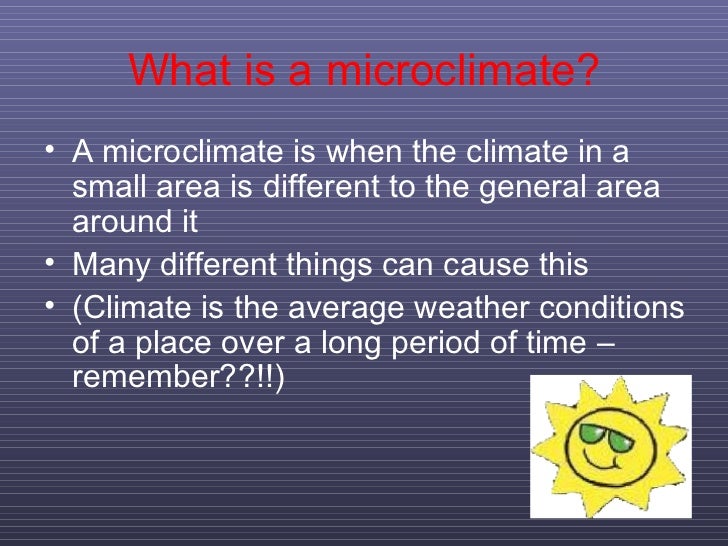
Image source: https://image.slidesharecdn.com/microclimate-factors-26723/95/microclimate-factors-2-728.jpg?cb=1180803137
The career outlook for a Climatologist is favorable. They make on average $55-$95 thousand a year.
He or she predicts what the weather is going to do, including the winds, and the amount of precipitation we are going to have.
By contrast, a climatologist studies trending climate over the long term. For example, the climate you live in depends on where you live geographically. If you live in the South of the United States, for example, your weather is generally going to be much warmer overall that it will be if you live in the Midwest or in the northeastern region of the United States. This "climate" is what a climatologist studies, not short-term weather patterns predicting what's going to happen today, tomorrow or next week in the weather so that you can wear a raincoat out the next time you go to work or school, for example.
What climate determines
The climate you live in determines several things about the area you live in. The type of plants that grow there, are one example of what climate affects. As a climatologist, you study the climate in a particular area and then try to forecast what's going to happen in the long term. What will happen with climate over the long term affects everything, from food production, to survival of endangered species, to energy usage, even health, life expectancy, or the very survival of the human race itself.
Becoming a climatologist
If you become a climatologist, you'll need to study physical and biological sciences and get a degree in atmospheric science or something similar. In general, you'll start working with other climatologists who are more experienced than you are. As you advance in your profession, you can specialize in what you feel most comfortable with, such as in the lab doing data analysis or in the field collecting research.
What does being a climatologist have to do with being "green"?
As a climatologist, you not only study the long-term trends in climate within a given area, but you also try to forecast what's going to happen over the long-term with the climate in a given area based upon several characteristics. Among the things you study, for example, are the effects pollution has on climate both now and in the future. For example, you study what's called "atmospheric aerosol content," which are microscopic particles NOT made of gas but that nonetheless affect climate like greenhouse gases do. These types of particles can be both natural and man-made. Some examples include mineral dust, ammonium sulfate, pollen, carbon or soot emissions, and so on.
By studying these things, you as a climatologist can help predict how our human behavior is affecting the earth either negatively or positively in regard to climate. You can also work with other scientists to make recommendations as to changes humans can make so that we positively affect our climate and therefore our very survival.
For example, climatologists were among the instrumental scientists who discovered global warming and told us what we can do about it so as to slow it down and therefore protect the health of the planet, other animals' survival, and our own survival, too.
In other words, you as a climatologist can absolutely give humans the knowledge we need to change how we behave so that we protect the planet, ourselves, and the other species that live here.
